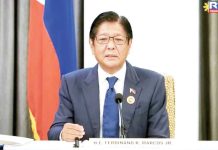
MANILA – President Ferdinand “Bongbong” Marcos Jr. expressed optimism over the long-delayed adoption of a legally binding Code of Conduct (COC) on the South China Sea.
According to Presidential Communications Office’s Undersecretary Claire Castro, the Chief Executive raised the matter during the ASEAN plenary session in Kuala Lumpur, Malaysia.
“President Ferdinand Marcos Jr. is very optimistic that there will be a final, rather conclusion, on this legally binding Code of Conduct regarding the South China Sea. He is very optimistic that’s why he brings this up to the plenary just this morning,” Castro said.
Castro, however, stated that while President Marcos sees the possible creation of the code, it will still be up to other member countries on how they want to tackle the issue.
“Depende ‘yan sa bawat bansa, siyempre may mga involved na bansa tulad ng China, iba pang miyembro ng ASEAN, so depende kung papaano ang takbo ng pag-uusap,” Castro said.
The proposed Code of Conduct, which has been under negotiation between ASEAN and China for more than 20 years, aims to create explicit rules and protocols to avert maritime incidents and reduce tensions in the contested South China Sea.
Tensions in the area have continued due to China’s extensive claims that intersect with the exclusive economic zones (EEZs) of ASEAN member states such as the Philippines, Vietnam, Malaysia, Brunei, and Indonesia.
The situation has been further exacerbated by China’s dismissal of the 2016 arbitral ruling from the Permanent Court of Arbitration in The Hague, which nullified its broad claims.
Marcos, in a speech delivered during the ASEAN Summit, emphasized the danger of miscalculations at sea, the necessity of ensuring maritime stability, and the importance of protecting the rights of Southeast Asian nations in accordance with international law.
The discussions are occurring amid increasing pressure for ASEAN to present a cohesive stance in addressing Beijing’s assertiveness and to finalize a code that transcends mere symbolic language and possesses legal significance./PN






